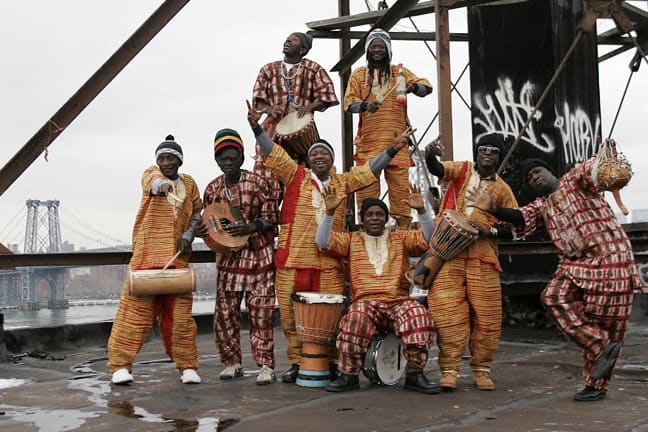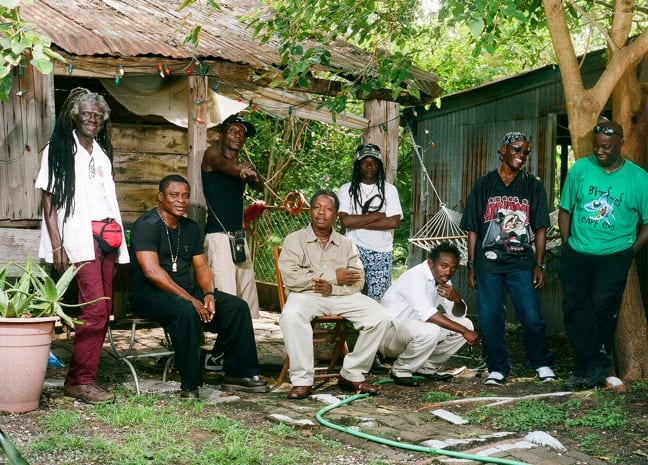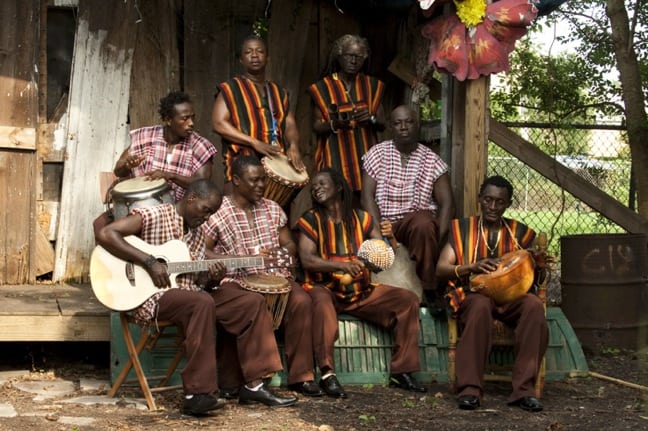Sierra Leone Refugee All-Stars Interview
There are hundreds (if not thousands) of popular bands who have written songs about war over the past 50 years, but few who have seen its tragedy first-hand like Sierra Leone’s Refugee All Stars. As their name implies, the group originally came together in refugee camps in the Republic of Guinea after a bloody, brutal war broke out in their West African home.
Founded by Reuben Koroma and his wife, Grace, with guitarist Francis John Langba (a.k.a. Franco) and bassist Idrissa Bangura (a.k.a. Mallam), the group gradually attracted new members as they moved from one refugee camp to the next. They also built up a increasingly fervent following, as word spread of the amazing musicians who brought joy and elation to people drowning in misery.
The buzz brought the attention of American filmmakers Zach Niles and Banker White, who trailed the group from camp to camp to create the award-winning documentary Sierra Leone’s Refugee All Stars, which launched the band’s careers on the international stage. Returning to their homes in Freetown after the war in Sierra Leone ended, the group was championed by celebs such as Sir Paul McCartney and Angelina Jolie, and even appeared on The Oprah Winfrey Show.
Now, the band is back with its third album, Radio Salone, and they’re currently touring to spread their messages of positivity and hope in the face of adversity. We recently caught up with Koroma on a tour bus in the American Midwest to talk about the group’s arduous, inspirational journey.
How did you guys originally meet in the refugee camps and start the band?
It was in the late ‘90s, when the war in Sierra Leone first started. We sought refuge in the neighboring country, the Republic of Guinea. When we arrived, it was a very bad place in the sense that there was no good water to drink. Here we were in a state of confusion– we missed our country, we were separated from our love ones, and some of us lost family members. We were agitated, and everyone has a psychological problem. We lived there for some time. So I thought, instead of thinking about what had happened to us, why not do something here? My wife and I started singing together just to heal ourselves and forget about what had happened to us. I was looking for other musicians and I found Francis John Langba (a.k.a. Franco), who brought his guitar. I told him about my vision, and that’s how the three of us started. We looked out for musicians and, anytime we found one, we incorporated that person into the group.
What effect did you see this music having on the people in the refugee camps?
The feedback was very positive when we started. Our fellow refugees really grew love for it. Every time we started to play, they would come around us, sometimes in small quantities. As we kept doing it, the number grew. It was not very long until we started having people all around us, and people loved it. We saw most of the people happy and smiling. We played music and they felt comforted. That’s when we knew music could play an important role in the lives of people with psychological problems. We kept doing this until they started asking us to play parties in the camp.
Some people hear your music and think of it as inspired by reggae. Can you tell me about that connection?
Sierra Leone historically has a very strong connection with Jamaica. The Maroons (descendants of African slaves) were taken from Jamaica and brought to Freetown. I believe they must have come with a lot of influences, which they began to incorporate into our Sierra Leone sound, which is 100% similar to the “one drop” style of reggae in Jamaica. It’s gradually diminishing now because of technology, but when we were growing up it used to be the most youthful entertainment. When reggae first came out in Jamaica, everybody in Sierra Leone fell in love with it because of the similarity of the rhythm.
You address many sociopolitical issues in your lyrics. Can you talk about some of the more pressing issues that concern you?
On our first album, one of the social issues was the refugee issue, which is all about war . We still have many refugees languishing. Since then, we had the inspiration of writing songs that have to do with issues affecting other people of the world, not only Sierra Leone. On our second album, we talked about global warming, which is an issue affecting the entire world.
Talk to me about Zach Niles and Banker White and how their film about the Sierra Leone Refugee All Stars impacted your career and your life?
I call Zach Niles and Banker White “the discoverers.” They discovered our talent in Africa and then made a documentary film about us in the United States. There was a film festival organized by the American Film Institute in LA in 2005, and we won the Best Documentary Award. Since then, everyone wants to see us everywhere in the world because of that. I believe these guys took us from the garbage and put us in a show glass. I believe these are the guys that really brought our story here to the West and really helped us throughout our struggle until we were known internationally. I’m always grateful to them.
What’s the reception like when you come home to Freetown? Do the people of Sierra Leone treat you differently now?
Yes. They treat us as celebrities and they are very proud of us. Everywhere in Sierra Leone, everyone knows that the Refugee All Stars is the biggest international band. Sometimes when we have international people visiting our country, they will engage us to play.
Let’s talk about Radio Salone: Can you explain the concept behind it?
The concept behind Radio Salone is that we are giving back to the radio, because it’s a powerful source of our musical inspiration. Back home, we listen to the radio and, through it, we are able to listen to different rhythms from all over the world. That inspires us to create music with different rhythms.
How would you say the music on this one is different from your previous albums?
The music of Radio Salone really represents our traditional culture. It has Goombay interludes and there’s more of an African musical influence, whereas the previous album had more reggae music.
Your website says the band is committed to doing “what they can to turn their country around, and their weapon in this struggle is music.” What changes do you hope to see in Sierra Leone and Africa as a whole in the future?
I hope to see stability, firstly, and then development. I think that’s what we need. If our countries are stable and we work toward development, then Africa will do better than it has in the past. –Bret Love





